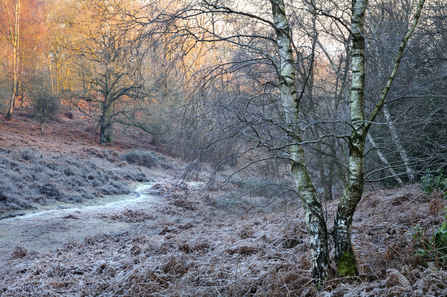
Bowdown Woods in winter. Photo by Rob Appleby
Bowdown Woods in winter. Photo by Rob Appleby

Bowdown Woods in winter. Photo by Rob Appleby
This nature reserve has three areas - Bowdown, Bomb Site and Baynes, all with a different character.
The Bomb Site is so named because it was an ammunition store during and after the Second World War. It is a great example of how nature can thrive and develop on a site vacated by people. Many old, surfaced tracks create a network through the young birch and oak woodland that has colonised the site. Try the short Wildlife Walk from the car park - it's on surfaced tracks and ideal for less mobile visitors.
Bowdown is magical, dense ancient woodland, which has views across the Kennet Valley. The 1-mile Wildlife Walk takes in some damp clay areas on the lower slopes and steep climbs up to higher, drier ground.
Finally, Baynes is the most secretive part of the wood. The dense ancient woodland here has lots of streams and some steep paths. The Wildlife Walk has some steep sections, steps and bridges.
You can explore the reserve and wider countryside around Bowdown Woods on our 6-mile circular walk.

Lapwing in flight by David Tipling/2020VISION
Nature reclaimed this worked-out chalk quarry and created an outstanding centre for wildlife, which gives nature-lovers of all ages easy access to an amazing range of wild plants and animals.
College Lake is widely regarded as one of the best places in Buckinghamshire for water birds, and with many hides overlooking the lake, this is a great destination for bird watchers or for families, whatever the weather or time of year. The two-mile circular walk around the lake gives you a good view of the entire site. 90% of the Wild Trail is surfaced and suitable for robust mobility scooters, and Graham's Hide is accessible for wheelchairs.
There are two trampers available to borrow. These are free of charge but need to be booked in advance. Call us on 01442 826774 or collegelake@bbowt.org.uk to book.
Take a tour of College Lake nature reserve (https://youtu.be/XNF55eFu3kc)
Join warden Leo Keedy on a short virtual tour of College Lake nature reserve and discover some of the site's highlights.

Dry Sandford Pit is one of the Trust's nature reserves within Cothill Fen along with Hitchcopse Pit, Lashford Lane Fen and Parsonage Moor. This is the largest area of alkaline fen in central England and the reserves are a nationally important collection of wildlife sites. In winter, discover the variety of lichens and mosses here, and look out for wintering birds like redwing and fieldfare.
Dry Sandford Pit was once a limestone quarry and now includes fascinating fossil-rich cliffs, fen and woodland. The ring of sandy cliffs create a secluded spot where nature and geology are both on show. The cliff face reveals ancient fossils laid down during the era of the dinosaurs. Please don't climb on the cliffs, and leave the fossils for others to enjoy.
Explore Cothill Fen and the nature reserves on our circular walk.

Throughout the year, Finemere Wood has the thrilling atmosphere of a very old, wild place. It was once used by kings and queens for hunting wild boar. Along with Rushbeds Wood and Whitecross Green Wood nature reserves, also in Buckinghamshire, it was a part of the ancient Royal Forest of Bernwood.
Finemere Wood is an excellent place to see and hear birds as you follow the 1.5-mile Wildlife Walk through the reserve. The thick scrub and developing coppice rings out with the sound of song thrushes, bullfinches and flocks of tits. Look out for woodpeckers, nuthatches and treecreepers feeding among the creviced bark.
You can read more about our work at Finemere Wood in volunteer warden, Charlotte Karmali's, regular blogs.

View from Hartslock nature reserve over Goring Gap by Craig Howes (craighowesphotography.co.uk)
Stroll along the River Thames from Goring-on-Thames to reach Hartslock nature reserve. The magnificent views from the reserve stretch out over Goring Gap and the winding River Thames and are worth the climb up the steep hill!
You might come across some of our sheep here, which are doing an important job of grazing the land. Please leave them in peace and don't try to feed or touch them.
Explore the area further with our circular Wild Walk, which starts in Goring before heading to the reserve and on through the surrounding countryside.

Long-tailed tits. Photo by Roy McDonald
Lying south-west of Newbury, this rare Berkshire heathland was once part of the old Inkpen Great Common where villagers had rights to graze livestock and collect firewood and gorse for feeding their ovens.
Today's nature reserve is split into two parts. The smaller south-western portion is now a small woodland of naturally regenerated oak and birch. The larger eastern part includes areas of heather and gorse, fringed by silver birch and oak, a small valley bog and a pond. Some parts can get very wet in winter so be prepared and wear wellies!
Be sure to visit to nearby Inkpen Crocus Field in late spring when thousands of crocuses bloom.